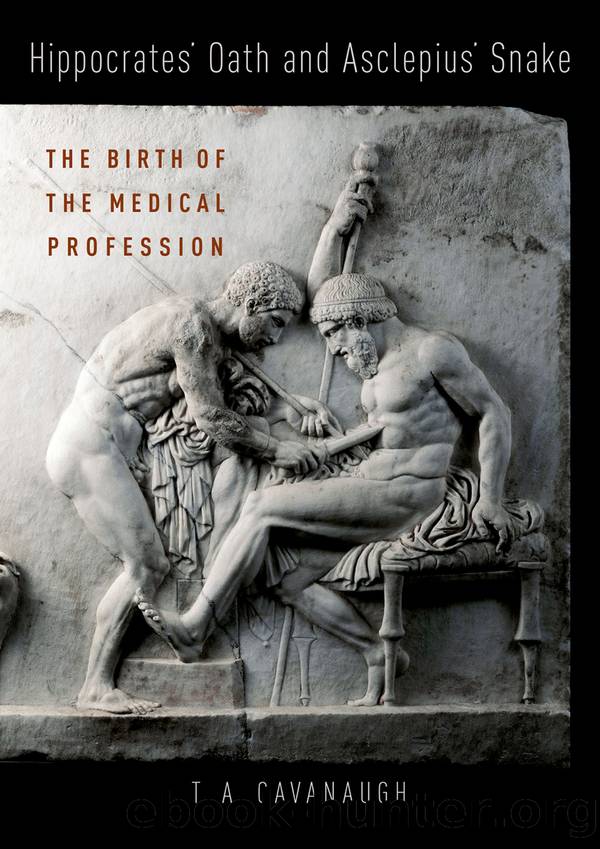Hippocrates' Oath and Asclepius' Snake by T.A. Cavanaugh;

Author:T.A. Cavanaugh;
Language: eng
Format: epub
Publisher: OUP Premium
Published: 2017-06-15T00:00:00+00:00
3.3.3 Attempts to Make Physicians Apollonian
Guillotin exemplifies the Apollonian physician who proposes to kill less harmfully. Corresponding to the Apollonian physician, one finds a public requesting that doctors kill. Recall the words of the anthropologist Margaret Mead (noted previously in 1.3). She writes:
society is always attempting to make the physician into a killerâto kill the defective child at birth, to leave the sleeping pills beside the bed of the cancer patient, ⦠it is the duty of society to protect the physician from such requests. (Levine 1972, 324-5)
Mead observes that we repeatedly ask physicians to kill. I wish, briefly, to note that our attempts do not seem to have flagged.
One finds contemporary governments asking physicians (and allied caregivers such as nurses and pharmacists) to be significantly involved in capital punishment. Indeed, some governments even require that the death penalty include a physicianâs extensive participation. In the United States, the state of North Carolina mandates that physicians and nurses (and, by implication, pharmacists) participate closely in carrying out the death penalty (in contrast to cooperating in an incidental fashion by, e.g., a doctor certifying death). The Supreme Court of North Carolina ruled that the North Carolina Medical Board (which licenses physicians) cannot restrict physician participation in capital punishment to the physician being physically present at an execution. Rather, in opposition to the Medical Boardâs (on the face of things, principled and balanced) stance, the legislature can, as it did in North Carolina General Statute 15-190, require that a physician âmonitor the essential body functions of the condemned inmate and notify the Warden immediately upon his or her determination that the inmate shows signs of undue pain or suffering.â
Notably, the legislature decrees that the physician be employed lest undue pain and suffering in the administration of the death penalty render the same a violation of the US Constitutionâs eighth amendment, prohibiting âcruel and unusual punishment.â This instances an Apollonian view of the physician as a harm-reducer. So conceived, one would naturally enlist a physician so as to punish least harmfully. Of course, this account of medicine errs. For it proposes that punishing (which necessarily involves the imposition of a harm) comports with medicine. Yet, medicine exclusively cares for a subject. Moreover, it avoids harming, especially deliberate harmingâeven in order to reduce overall harm. Additionally, as noted, one mistakenly thinks of the condemned as a proper subject of the physicianâs therapy (or the subject of medical caregivers more generallyânurses and pharmacists). Caregivers administer to patients, those laboring under illness. While dire, being condemned to death does not make one a patient. Thus, those who would have caregivers punish stray widely.
Referring to the incompatibility of punishing and medicine, the North Carolina Medical Board (in its prohibition of a physicianâs so monitoring the condemned) noted that âphysician participation in capital punishment is a departure from the ethics of the medical professionâ (N. C. 2009, 645). Additionally, the Medical Board cited the American Medical Associationâs Code of Medical Ethics section 2.06, which distinguishes the personal opinion
Download
This site does not store any files on its server. We only index and link to content provided by other sites. Please contact the content providers to delete copyright contents if any and email us, we'll remove relevant links or contents immediately.
Human Diseases (MindTap Course List) (by Team-IRA) by Marianne Neighbors Ruth Tannehill-Jones(907)
Cancer Cell Culture by Unknown(455)
The Neglected Dimension of Global Security: A Framework to Counter Infectious Disease Crises by National Academy of Medicine Secretariat(449)
Imaging in Urology by Mitchell Tublin MD Joel B Nelson MD(431)
Statistical Methods in Health Disparity Research by J. Sunil Rao(428)
Health Behavior: Theory, Research, and Practice by Karen Glanz & Barbara K. Rimer & K. Viswanath(390)
Achieving Procreation : Childlessness and IVF in Turkey by Merve Demircioğlu Göknar(381)
Short Course in Medical Terminology by Nath Judi L.;(352)
Wilkins' Clinical Practice of the Dental Hygienist by Boyd Linda D.;Mallonee Lisa F.; & Lisa F. Mallonee(327)
Clinical Research in Occupational Therapy, Sixth Edition by Martin Rice;(322)
Murray's Basic Medical Microbiology E-Book by Murray Patrick R.;(305)
Anatomical Kinesiology by Gross Michael;(304)
Neuroscience Fundamentals for Rehabilitation by Lundy-Ekman Laurie(303)
Psychedelics As Psychiatric Medications by Nutt David;Castle David;(291)
The Human Central Nervous System by Unknown(287)
A Pocket Guide for Medical Students: From Enrollment to Job Interviews by Sarah Cuschieri(284)
Rang & Dale's Pharmacology 9th Edition plus Flashcards 2nd Edition by Unknown(282)
The Handbook of Medicinal Chemistry by Simon E Ward;Andrew Davis;(265)
Public Health and Society: Current Issues by Burke Lillian D.;Weill Barbara;(264)
